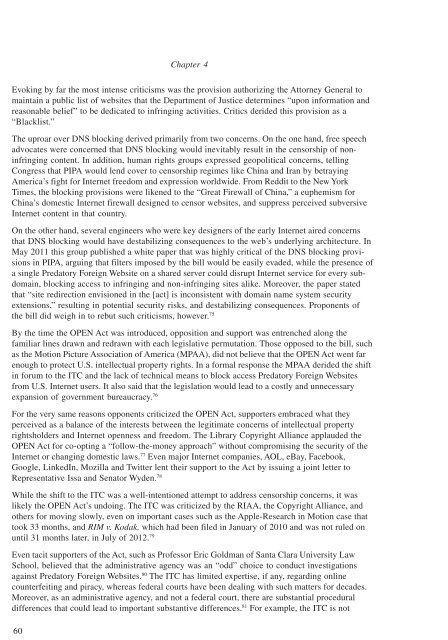1oz61wa
1oz61wa
1oz61wa
Create successful ePaper yourself
Turn your PDF publications into a flip-book with our unique Google optimized e-Paper software.
Chapter 4<br />
Evoking by far the most intense criticisms was the provision authorizing the Attorney General to<br />
maintain a public list of websites that the Department of Justice determines “upon information and<br />
reasonable belief” to be dedicated to infringing activities. Critics derided this provision as a<br />
“Blacklist.”<br />
The uproar over DNS blocking derived primarily from two concerns. On the one hand, free speech<br />
advocates were concerned that DNS blocking would inevitably result in the censorship of noninfringing<br />
content. In addition, human rights groups expressed geopolitical concerns, telling<br />
Congress that PIPA would lend cover to censorship regimes like China and Iran by betraying<br />
America’s fight for Internet freedom and expression worldwide. From Reddit to the New York<br />
Times, the blocking provisions were likened to the “Great Firewall of China,” a euphemism for<br />
China’s domestic Internet firewall designed to censor websites, and suppress perceived subversive<br />
Internet content in that country.<br />
On the other hand, several engineers who were key designers of the early Internet aired concerns<br />
that DNS blocking would have destabilizing consequences to the web’s underlying architecture. In<br />
May 2011 this group published a white paper that was highly critical of the DNS blocking provisions<br />
in PIPA, arguing that filters imposed by the bill would be easily evaded, while the presence of<br />
a single Predatory Foreign Website on a shared server could disrupt Internet service for every subdomain,<br />
blocking access to infringing and non-infringing sites alike. Moreover, the paper stated<br />
that “site redirection envisioned in the [act] is inconsistent with domain name system security<br />
extensions,” resulting in potential security risks, and destabilizing consequences. Proponents of<br />
the bill did weigh in to rebut such criticisms, however. 75<br />
By the time the OPEN Act was introduced, opposition and support was entrenched along the<br />
familiar lines drawn and redrawn with each legislative permutation. Those opposed to the bill, such<br />
as the Motion Picture Association of America (MPAA), did not believe that the OPEN Act went far<br />
enough to protect U.S. intellectual property rights. In a formal response the MPAA derided the shift<br />
in forum to the ITC and the lack of technical means to block access Predatory Foreign Websites<br />
from U.S. Internet users. It also said that the legislation would lead to a costly and unnecessary<br />
expansion of government bureaucracy. 76<br />
For the very same reasons opponents criticized the OPEN Act, supporters embraced what they<br />
perceived as a balance of the interests between the legitimate concerns of intellectual property<br />
rightsholders and Internet openness and freedom. The Library Copyright Alliance applauded the<br />
OPEN Act for co-opting a “follow-the-money approach” without compromising the security of the<br />
Internet or changing domestic laws. 77 Even major Internet companies, AOL, eBay, Facebook,<br />
Google, LinkedIn, Mozilla and Twitter lent their support to the Act by issuing a joint letter to<br />
Representative Issa and Senator Wyden. 78<br />
While the shift to the ITC was a well-intentioned attempt to address censorship concerns, it was<br />
likely the OPEN Act’s undoing. The ITC was criticized by the RIAA, the Copyright Alliance, and<br />
others for moving slowly, even on important cases such as the Apple-Research in Motion case that<br />
took 33 months, and RIM v. Kodak, which had been filed in January of 2010 and was not ruled on<br />
until 31 months later, in July of 2012. 79<br />
Even tacit supporters of the Act, such as Professor Eric Goldman of Santa Clara University Law<br />
School, believed that the administrative agency was an “odd” choice to conduct investigations<br />
against Predatory Foreign Websites. 80 The ITC has limited expertise, if any, regarding online<br />
counterfeiting and piracy, whereas federal courts have been dealing with such matters for decades.<br />
Moreover, as an administrative agency, and not a federal court, there are substantial procedural<br />
differences that could lead to important substantive differences. 81 For example, the ITC is not<br />
60


